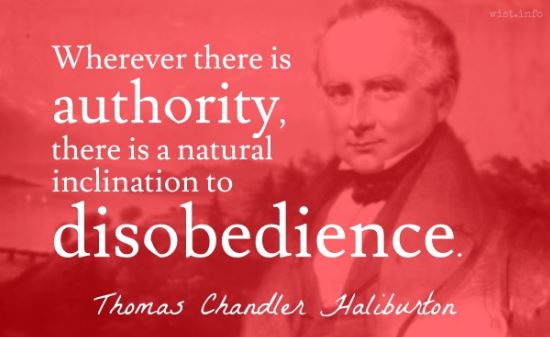DISOBEDIENCE, n. The silver lining to the cloud of servitude.
Ambrose Bierce (1842-1914?) American writer and journalist
“Disobedience,” The Cynic’s Word Book (1906)
(Source)
Included in The Devil's Dictionary (1911). Originally published in the "Devil's Dictionary" column in the San Francisco Wasp (1882-04-02).
Quotations about:
disobedience
Note not all quotations have been tagged, so Search may find additional quotes on this topic.
Misbehavior and punishment are not opposites that cancel each other; on the contrary, they breed and reinforce each other. Punishment does not deter misconduct. It makes the offender more skillful in escaping detection. When children are punished they resolve to be more careful, not more obedient or responsible.
Haim Ginott (1922-1973) Israeli-American school teacher, child psychologist, psychotherapist [b. Haim Ginzburg]
Between Parent and Child: Revised and Updated Edition, ch. 5 “Discipline” (2003 ed.) [with A. Ginott and H. W. Goddard]
(Source)
A man who owns a dog is, in every sense of the word, its master; the term expresses accurately their mutual relations. But it is ridiculous when applied to the limited possession of a cat. I am certainly not Agrippina’s mistress, and the assumption of authority on my part would be a mere empty dignity, like those swelling titles which afford such innocent delight to the Freemasons of our severe republic. If I call Agrippina, she does not come; if I tell her to go away, she remains where she is; if I try to persuade her to show off her one or two little accomplishments, she refuses, with courteous but unswerving decision.
Political loyalty, military obedience are excellent things, but they neither require nor do they justify the commission of patently wicked acts. There comes a point where a man must refuse to answer to his leader if he is also to answer to his conscience.
Hartley Shawcross (1902-2003) English barrister, politician, diplomat
Opening remarks, Nuremberg War Crimes Tribunal (4 Dec 1945)
(Source)
Shawcross was Attorney General of the UK and Chief Prosecutor for the UK at the tribunal
I’ll have no dealings
With law-breakers, critics of the government:
Whoever is chosen to govern should be obeyed ––
Must be obeyed, in all things, great and small,
Just and unjust! O Haimon,
The man who knows how to obey, and that man only,
Knows how to give commands when the time comes.
You can depend on him, no matter how fast
The spears come: he’s a good soldier, he’ll stick it out.
Anarchy, anarchy! Show me a greater evil!
This is why cities tumble and the great houses rain down,
This is what scatters armies!
No, no: good lives are made so by discipline.
We keep the laws then, and the lawmakers.Sophocles (496-406 BC) Greek tragic playwright
Antigone, l. 665ff [Creon] (441 BC) [tr. Fitts/Fitzgerald (1939), l. 525ff]
(Source)
Alt. trans.:
But whoso wantonly
Or strains the laws or sets about dictating
To those who rule, it is not possible
That such a one should ever earn my praise.
No! when a city constitutes a chief,
It well befitteth all men to obey
His great or small, just or unjust behests.
And I should confidently trust that he,
Whose law is such, would from fixed habitude
Both wisely rule and loyally obey.
he too, when posted in the battled line,
Amid the storm of fight, would keep his ground,
Brave and unswerving by his comrade's side.
There is no greater ill than disobedience.
'Tis this which ruins cities: this it is
Which works the downfall of a noble house.
And when, in battle, spear is locked with spear,
'Tis this again which breaks and routes the phalanx.
But when men keep the line, their discipline
For the most part ensures their safety. Thus,
It is our duty still to aid the laws.
[tr. Donaldson (1848)]
But he who overbears the laws, or thinks
To overrule his rulers, such as one
I never will allow. Whome'er the State
Appoints must be obeyed in everything,
But small and great, just and unjust alike.
I warrant such a one in either case
Would shine, as King or subject; such a man
Would in the storm of battle stand his ground,
A comrade leal and true; but Anarchy --
What evils are not wrought by Anarchy!
She ruins States, and overthrows the home,
She dissipates and routs the embattled host;
While discipline preserves the ordered ranks.
Therefore we must maintain authority.
[tr. Campbell (1873)]
But he that wantonly defies the law,
Or thinks to dictate to authority,
Shall have no praise from me. What power soe'er
The city hath ordained, must be obeyed
In little things and great things, right or wrong.
The man who so obeys, I have good hope
Will govern and be governed as he ought,
And in the storm of battle at my side
Will stand a faithful and a trusty comrade.
But what more fatal than the lapse of rule?
This ruins cities, this lays houses waste,
This joins with the assault of war to break
Full numbered armies into hopeless rout;
And in the unbroken host 'tis nought but rule
That keeps those many bodies from defeat,
I must be zealous to defend the law.
[tr. Storr (1859)]
But if anyone oversteps and does violence to the laws, or thinks to dictate to those in power, such a one will never win praise from me. No, whomever the city may appoint, that man must be obeyed in matters small and great and in matters just and unjust. And I would feel confident that such a man would be a fine ruler no less than a good and willing subject, and that beneath a hail of spears he would stand his ground where posted, a loyal and brave comrade in the battle line. But there is no evil worse than disobedience. This destroys cities; this overturns homes; this breaks the ranks of allied spears into headlong rout. But the lives of men who prosper upright, of these obedience has saved the greatest part. Therefore we must defend those who respect order.
[tr. Jebb (1891)]
But if any one transgresses, and does violence to the laws, or thinks to dictate to his rulers, such an on can win no praise from me. No, whomsoever the city may appoint, that man must be obeyed, in little things and great, in just things and unjust; and I should feel sure that one who thus obey would be a good ruler no less than a good subject, and in the storm of spears would stand his ground where he was set, loyal and dauntless at his comrade's side. But disobedience is the worst of evils. This it is that ruins cities; this makes homes desolate; by this, the ranks of allies are broken into headlong rout; but, of the lives whose course is fair, the greater part owes safety to obedience. Therefore we must support the cause of order.
[tr. Jebb (1917), l. 661ff]
To transgress
Or twist the law to one’s own pleasure, presume
To order where one should obey, is sinful,
And I will have none of it.
He whom the State appoints must be obeyed
To the smallest matter, be it right -- or wrong.
And he that rules his household, without a doubt,
Will make the wisest king, or, for that matter,
The staunchest subject. He will be the man
You can depend on in the storm of war,
The faithfullest comrade in the day of battle.
There is no more deadly peril than disobedience;
States are devoured by it, homes laid in ruins,
Armies defeated, victory turned to rout.
While simple obedience saves the lives of hundreds
Of honest folk. Therefore, I hold to the law,
And will never betray it.
[tr. Watling (1947), l. 559ff]
But whoever steps out of line, violates the laws
or presumes to hand out orders to his superiors,
he'll win no praise from me. But that man
the city places in authority, his orders
must be obeyed, large and small,
right and wrong. Anarchy --
show me a greater crime in all the earth!
She, she destroys cities, rips up houses,
breaks the ranks of spearmen into headlong rout.
But the ones who last it out, the great mass of them
owe their lives to discipline. Therefore
we must defend the men who live by law.
[tr. Fagles (1982), l. 741ff]
So, if someone goes too far and breaks the law,
Or tries to tell his masters what to do,
He will have nothing but contempt from me.
But when a city takes a leader, you must obey,
Whether his commands are trivial, or right, or wrong.
But reject one man ruling another, and that's the worst.
Anarchy tears up a city, divides a home,
Defeats an alliance of spears.
But when people stay in line and obey,
Their lives and everything else are safe.
For this reason, order must be maintained.
[tr. Woodruff (2001), l. 662ff]
He who violates the laws of the gods and his city, or wants to command its leaders, will never gain my respect. We must obey those whom the city has ordained to be its leaders. We should obey them, unquestioningly, in all things, minor or great, those we agree with and those we oppose. I believe such a man would govern well and he’d also be an obedient servant; and he’d stay at his post even in the hurricane of war, honourably, bravely defending his country. There’s no worse evil than anarchy. Anarchy destroys nations, my son. Anarchy destroys homes. Anarchy turns the spears of allies into fleeing cowards. Those men left standing, the survivors, have been saved by discipline. That’s why each man must protect, with all his might, law and order.
[tr. Theodoridis (2004)]
But anyone who’s proud
and violates our laws or thinks he’ll tell
our leaders what to do, a man like that
wins no praise from me. No. We must obey
whatever man the city puts in charge,
no matter what the issue -- great or small,
just or unjust. For there’s no greater evil
than a lack of leadership. That destroys
whole cities, turns households into ruins,
and in war makes soldiers break and run away.
When men succeed, what keeps their lives secure
in almost every case is their obedience.
That’s why they must support those in control.
[tr. Johnston (2005), l. 757ff ]
For the lesson of such stories is simple and within everybody’s grasp. Politically speaking, it is that under conditions of terror, most people will comply but some people will not, just as the lesson of the countries to which the Final Solution was proposed is that “it could happen” in most places but it did not happen everywhere. Humanly speaking, no more is required, and no more can reasonably be asked, for this planet to remain a place fit for human habitation.
Hannah Arendt (1906-1975) German-American philosopher, political theorist
Eichmann in Jerusalem: A Report on the Banality of Evil, ch. 14 (1963)
(Source)
Speaking of resistance to Nazi atrocities.
Now the abuse of authority can be of two kinds. First, when what is commanded by the ruler is contrary to the purpose for which the ruler was appointed: for example, if some sinful act is commanded contrary to the virtue which the ruler is ordained to foster and preserve. In this case, not only is one not bound to obey the ruler, but one is bound not to obey him, as in the case of the holy martyrs who suffered death rather than obey the ungodly commands of tyrants.
Second, when what is demanded goes beyond what the order of authority can require: if, for example, a master were to exact a payment which a servant is not bound to give, or something of the kind. In this case the subject is not bound to obey; nor, however, is he bound not to obey.
Thomas Aquinas (1225-1274) Italian friar, philosopher, theologian
Commentary on the Sentences of Peter Lombard [Scriptum super libros Sententiarium], Book 2, dist. 44, quest. 2, art. 2 (1252-56) [tr. Dyson (2002)]
(Source)
Alt. trans. [Dawson]:With regard to the abuse of authority, this also may come about in two ways. First, when what is ordered by an authority is opposed to the object for which that authority was constituted (if, for example, some sinful action is commanded or one which is contrary to virtue, when it is precisely for the protection and fostering of virtue that authority is instituted). In such a case, not only is there no obligation to obey the authority, but one is obliged to disobey it, as did the holy martyrs who suffered death rather than obey the impious commands of tyrants.
Secondly, when those who bear such authority command things which exceed the competence of such authority; as, for example, when a master demands payment from a servant which the latter is not bound to make, and other similar cases. In this instance the subject is free to obey or disobey.
She was already learning that if you ignore the rules people will, half the time, quietly rewrite them so that they don’t apply to you.
Terry Pratchett (1948-2015) English author
Equal Rites (1987)
(Source)
Of the character Eskarina "Esk" Smith, modeled after Pratchett's daughter, Rhianna.










